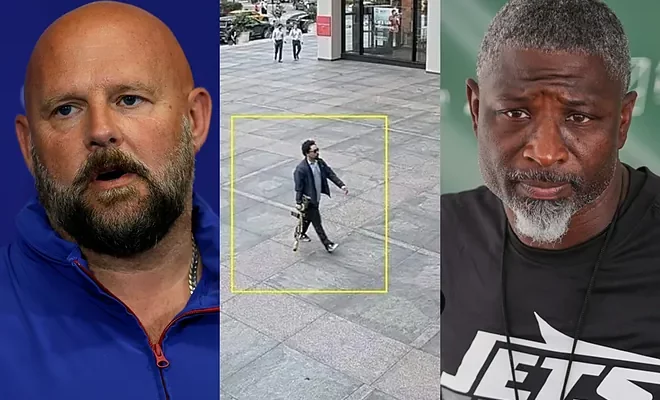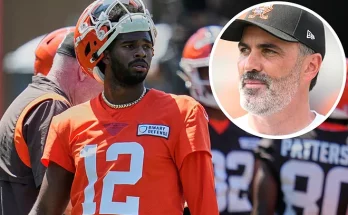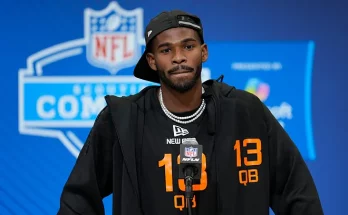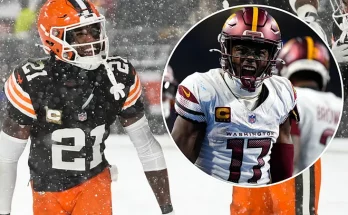In a moment that sent shockwaves through the entire football world and well beyond, tragedy struck the heart of the NFL’s operations on a somber Monday morning in New York City. The league’s corporate office, a symbol of order and unity in the billion-dollar empire of professional football, became the site of a senseless and heartbreaking shooting that claimed the lives of three individuals and left several others wounded. As law enforcement swarmed the midtown Manhattan headquarters and the world tried to process the horror, leaders and voices across the sport began to speak. Among the first and most heartfelt responses came from two men who understand the weight of leadership: New York Jets defensive coordinator Aaron Glenn and New York Giants head coach Brian Daboll.
Both men, representing the city’s two flagship franchises and a combined community of millions of fans, stood side by side—if not physically, then in spirit—with the grieving families, stunned employees, and shaken fans across the nation. Glenn, a former NFL player and a revered voice in coaching circles, released a solemn statement within hours of the news breaking, emphasizing not only the tragedy but also the importance of human connection in times of collective pain. He called for unity, healing, and reflection, noting that, “No title, no jersey, and no job can shield us from the pain that violence brings. Today, we all wear the same uniform—one of mourning, of empathy, and of action.”
Brian Daboll, never one to shy away from raw emotion, followed shortly after with his own response. Known for his fiery coaching demeanor and passionate support of his players, Daboll’s statement was notably personal. He recounted stories of visiting the NFL office over the years, recalling faces and names, administrative staff and media officials, security guards and marketing interns—many of whom he noted made the league feel “like a family beyond the sidelines.” He added, “To think that a place filled with people who give their lives to the sport, often without recognition or fame, would become a scene of devastation—it breaks my heart in ways I can’t describe.”
The tragedy touched not only those inside the NFL family, but countless fans, former players, league employees, and community figures who have long considered the NFL’s headquarters to be more than just an office building. For years, the league’s New York office has served as a bustling nerve center of the sport—home to the business minds behind television contracts, player policies, social justice initiatives, and the draft spectacle. It’s the beating heart of a league that commands Sundays in the fall, dominates prime-time advertising, and shapes American culture. That heart now bears a deep wound.
According to preliminary police reports, the shooting appears to have stemmed from a disgruntled former employee who had previously been terminated during a round of corporate restructuring. Eyewitnesses say the individual entered the building in the early morning hours under the guise of a scheduled appointment, bypassing several levels of security before opening fire in the lobby. Panic quickly erupted throughout the structure, and NYPD units responded within minutes. The suspect was taken into custody after a brief standoff on the 10th floor. Authorities are still investigating the full motive, and names of victims have not yet been released pending notification of next of kin.
The NFL has responded swiftly and forcefully, announcing that all league offices nationwide would close for 48 hours in remembrance and in coordination with law enforcement investigations. In a joint press release, Commissioner Roger Goodell expressed his “profound sorrow and outrage,” declaring that “this act of violence will not define our community—but the love and unity we show in response absolutely will.” He also vowed full cooperation with all law enforcement proceedings and promised a thorough review of internal security protocols.
The league has also pledged to support affected families through the NFL Foundation, launching an emergency relief fund for victims and their loved ones. Players from around the league—including Patrick Mahomes, Saquon Barkley, J.J. Watt, and Lamar Jackson—took to social media to share condolences and offer support, many using the hashtag #NFLFamilyStrong to signify solidarity. Several teams are planning moments of silence before their next preseason practices and games.
For New Yorkers, the emotional toll is amplified. The NFL office sits among other corporate skyscrapers in a city already no stranger to tragedy. But this was different—it wasn’t a random act of street crime, nor an abstract event in a distant place. It hit the core of an institution that has become part of the city’s cultural identity. From the annual NFL Draft events in Times Square to youth football initiatives in the Bronx and Brooklyn, the league’s New York roots run deep. Today, those roots feel bruised, but not broken.
Aaron Glenn, who once played for the Jets and now leads their defense, spoke again later in the day during a media availability. Asked how he was processing the day’s events, Glenn paused for a long time before answering, “I’ve been in locker rooms where we lost teammates. I’ve been to funerals of players and coaches I loved. But this… this hits different. Because we talk about football being family, and we say it all the time, but when something like this happens, you realize how true that really is. Those people in that building—they’re our family. And today we’re hurting.”
Brian Daboll, too, addressed reporters before Giants practice was postponed out of respect. He made no remarks about football strategies or roster battles. Instead, he focused entirely on compassion, grief, and unity. “We always talk about toughness in this league. But I think today the toughest thing we can do is look out for each other. Check in on someone. Call a colleague. Hug your kid. Because life is fragile, and the game stops when tragedy walks in the room.”
The league’s broadcasters also paused to recognize the lives lost. On NFL Network, the usually upbeat “Good Morning Football” program aired a special segment featuring emotional tributes from longtime analysts and hosts. ESPN and CBS Sports both ran moments of silence, and across sports radio, discussions shifted from training camp debates to the sobering reminder that behind the business of football lies a vast network of real people with real lives and real families.
For some, this tragedy is a wake-up call. Critics of the NFL’s sprawling corporate structure have long argued for increased mental health resources and better exit protocols for terminated employees. Others call for heightened office security, especially given the league’s high profile and its connection to controversial social topics. While it remains unclear what changes will emerge from this horror, what’s certain is that the human cost will be remembered forever.
As dusk fell over Manhattan, candles were lit outside the building’s main entrance. Makeshift memorials sprang up quickly—flowers, helmets, hand-written notes, and NFL jerseys, all laid out with care. Fans, employees, and even rival team supporters came together not to talk about games or wins or playoff hopes, but simply to honor the lives taken and the wounds left behind.
Jets owner Woody Johnson and Giants co-owner John Mara released a rare joint statement late in the evening, symbolizing a united front in a city often divided by gridiron loyalties. “There are moments when rivalry means nothing, and humanity means everything. Today is such a moment. We mourn as one, and we will heal as one.”
In the days to come, as the investigation unfolds and tributes continue to pour in, one thing has become abundantly clear: the NFL is more than just touchdowns and trophies. It is a community, a brotherhood and sisterhood of people who show up day after day—whether they’re calling plays, filing paperwork, or sweeping the floors—because they love the game. And when violence tries to tear that community apart, it is leaders like Aaron Glenn and Brian Daboll who remind us how to begin putting it back together.
Their words will echo beyond press rooms and beyond this moment of tragedy. Because in a city and a league known for passion, strength, and grit, it is empathy that now leads the way. And in that shared grief, the healing begins.



